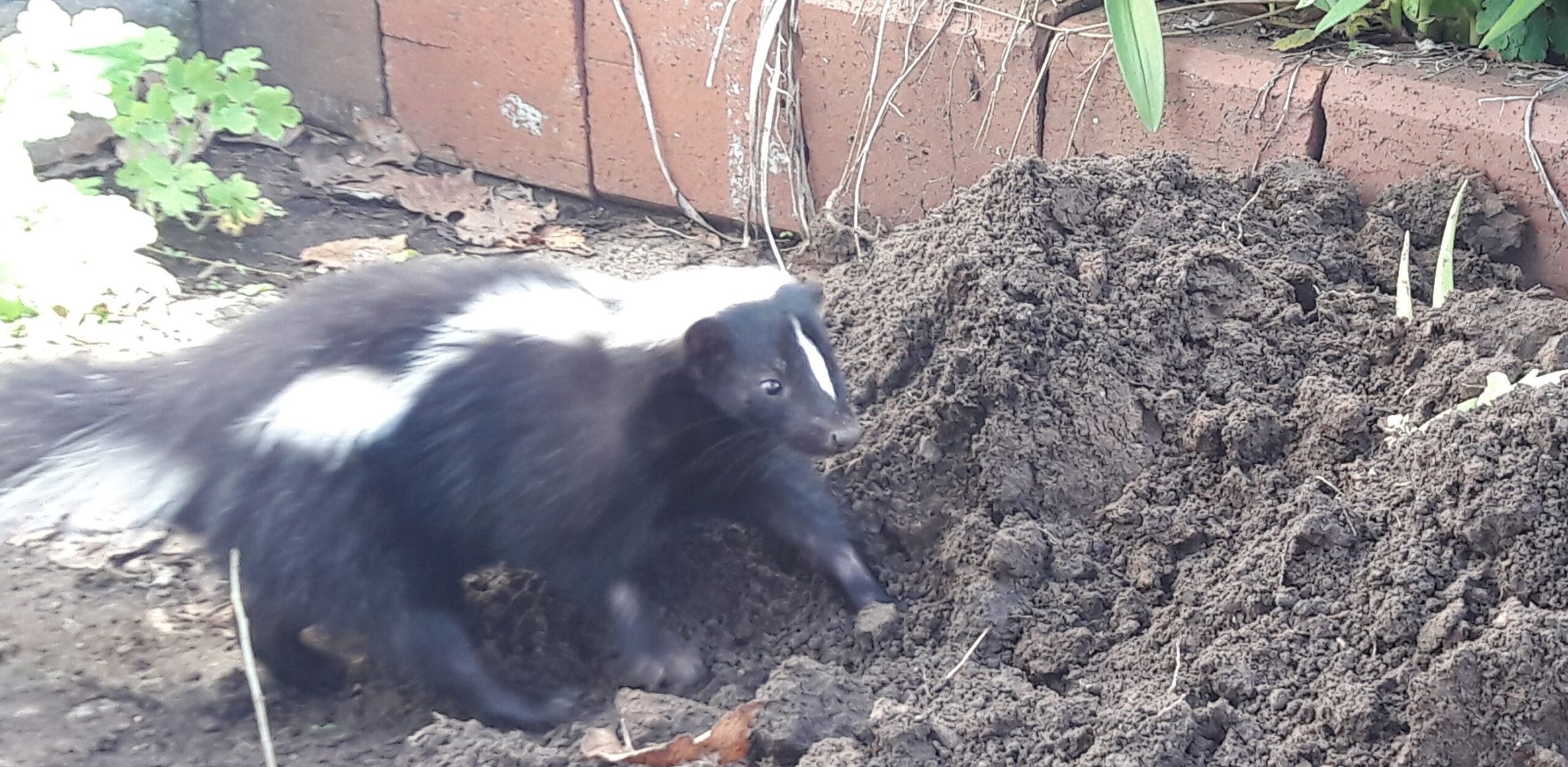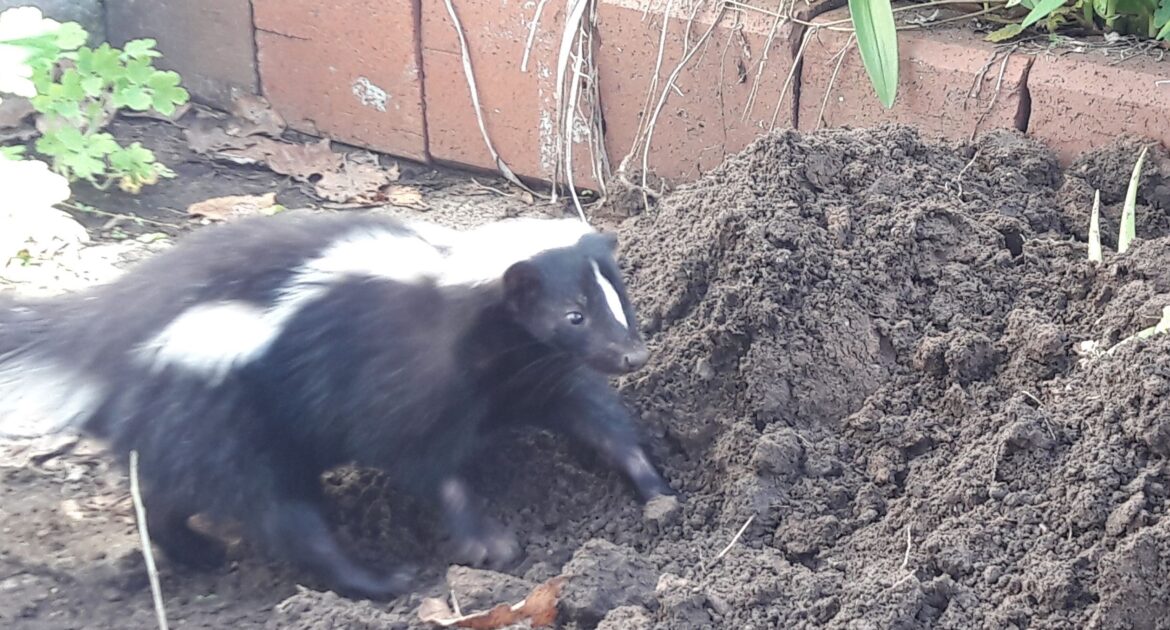That unmistakable smell has drifted into your home, and now you’re wondering what it means and if you should be concerned. A skunk smell in your house isn’t just an unpleasant sensory experience—it can be a sign of wildlife activity that requires attention. Just as the majestic Rocky Mountains define Denver’s skyline, a skunk’s pungent odor can completely dominate your home environment if not properly addressed.
At Skedaddle Humane Wildlife Control, we’ve helped countless Denver and Englewood homeowners resolve wildlife problems safely and effectively. Understanding what skunk smell means for your home is the first step toward finding a solution that works for your family and property.
What Does a Skunk Smell in Your House Actually Mean?
When that distinctive odor permeates your living space, it typically indicates one of several scenarios:
- A skunk has sprayed near your home’s foundation, vents, or windows
- A skunk has established a den under or near your property (commonly under decks, porches, or sheds)
- Your pet had an unfortunate encounter with a skunk outdoors
- A skunk has been injured or died on your property
Location indicators: The strength and persistence of the odor can help identify the source. A strong, lingering smell that seems to be coming from below your floors or from walls might indicate a skunk has taken residence underneath your home or within your structure.
Timing patterns: Noticing the smell primarily at night? This aligns with skunks’ nocturnal nature. Striped skunks in the Denver area are most active between dusk and dawn when they leave their dens to forage for food.
Signs That a Skunk Has Made Your Property Their Home
Beyond the unmistakable odor, there are several telltale indications that these animals have established residence on your property:
- Fresh digging marks around the perimeter of your deck, porch, or shed (skunks are powerful diggers)
- Conical holes in your lawn where skunks have been hunting for grubs and insects
- Disturbed garbage cans or evidence of foraging activity
- Skunk sightings near your home, especially at dawn or dusk
As our Skedaddle technicians often observe, these animals create distinct burrow entrances that are typically 4-6 inches in diameter with minimal debris around the opening, unlike the messy entrances that raccoons or other wildlife might leave behind.
What Does Skunk Odor Mean for Health and Safety
While the smell itself is unpleasant, you might be wondering if there are actual health risks associated with skunk odors in your home.
Physical Health Considerations
The chemical compounds in skunk spray can cause:
- Respiratory irritation – particularly problematic for those with asthma or other breathing conditions
- Eye irritation and temporary vision problems if direct exposure occurs
- Nausea or vomiting from prolonged exposure to strong odors
Important health note: While rare, skunks can be carriers of rabies and other diseases. This makes professional handling particularly important, as distinguishing between healthy skunks and those infected with rabies can be difficult for untrained individuals.
Psychological Effects of Persistent Skunk Odors
Don’t underestimate the psychological impact of living with persistent odors:
- Sleep disruption due to the pervasive smell
- Social embarrassment when having guests over
- Chronic stress from dealing with an ongoing odor problem
- Decreased enjoyment of your home environment
A Denver homeowner we assisted last year described the experience as “feeling like a prisoner in my own home” after weeks of dealing with a persistent skunk odor that penetrated their living space.
Skunk Smell Removal Tips for Different Scenarios
Depending on the source of the odor, there are different approaches to effectively neutralize skunk smells.
For Home Surfaces and Fabrics
Dealing with skunk odors involves different techniques depending on the surface affected.
For hard surfaces:
- Mix 1 quart of 3% hydrogen peroxide with ¼ cup baking soda and 1-2 teaspoons of dish soap
- Apply to affected surfaces, let sit for 10 minutes, then rinse thoroughly
- Never store this mixture in a closed container, as pressure can build up
For fabrics and upholstery, use commercial enzymatic cleaners specifically designed for odor neutralization. For laundry items, add ½ cup of baking soda to your regular detergent.
For Pets That Have Been Sprayed
If your furry friend had an unfortunate encounter:
- Keep them outdoors while you prepare a cleaning solution
- Mix 1 quart hydrogen peroxide (3%), ¼ cup baking soda, and 1 teaspoon liquid dish soap
- Thoroughly wet your pet’s coat with the solution (avoiding eyes, ears, and mouth)
- Let the solution sit for 5 minutes before rinsing completely
- Repeat if necessary
Warning: Commercial “skunk removal” products vary greatly in effectiveness. At Skedaddle, we’ve found that many homeowners waste money on products that mask rather than neutralize the odor compounds.
When DIY Methods Aren’t Enough: Understanding Professional Skunk Removal
While DIY methods can help with mild skunk odor problems, there are clear signs that professional intervention is necessary.
When to Call Professionals
Consider professional skunk removal services when:
- The odor persists despite multiple cleaning attempts
- You’ve identified a skunk den on your property
- You hear animal noises under your deck, porch, or home
- There are visible signs of digging and property damage
- You’ve had repeated skunk sightings around your home
In Englewood last summer, a family tried numerous home remedies for what they thought was a one-time skunk spray, only to discover a mother skunk had created a den beneath their deck with five kits. The situation required professional removal to ensure both human safety and humane treatment of the wildlife.
What Professional Skunk Removal Involves
At Skedaddle, our comprehensive approach to skunk problems includes:
- Thorough inspection to identify entry points and den locations
- Humane removal of skunks using specialized techniques that prevent spraying
- Safe relocation of any baby skunks using our heated baby reunion boxes
- Exclusion measures including the installation of buried heavy-gauge steel mesh to prevent future digging and entry
- Decontamination of affected areas to eliminate odors and potential health hazards
- Prevention strategies to make your property less attractive to skunks in the future
Seasonal Considerations for Skunk Problems in Denver
Understanding the seasonal patterns of skunk activity can help predict and prevent problems before they start.
Spring and Summer: Peak Activity Period
During warm months, skunks are highly active in Denver neighborhoods:
- May to June is when female skunks give birth to litters (typically 4-7 kits)
- Mother skunks become more defensive during this period, increasing the risk of spraying
- Young skunks begin venturing out by mid-summer, often leading to increased human encounters
- Grubs and insects are abundant, attracting skunks to well-maintained lawns in Englewood and surrounding areas
Fall: Preparation Period
As temperatures cool:
- Skunks begin searching for winter den sites
- They increase food consumption to build fat reserves
- This is often the optimal time for prevention measures before skunks settle in for winter
Winter: Denning Period
During colder months:
- Skunks don’t hibernate but enter extended periods of inactivity
- They remain in their dens for long periods, emerging only during mild spells
- Removal becomes urgent if odors or signs of skunk activity are noticed.
If you’re experiencing a persistent skunk smell in your Denver home, don’t delay in seeking professional help. Protect your health and home by contacting Skedaddle Humane Wildlife Control today. Our expert team is ready to provide safe, effective, and humane skunk removal services tailored to your specific needs. Enjoy a fresh, odor-free home environment and peace of mind—reach out to Skedaddle now, and let us help you reclaim your space from unwanted wildlife.




